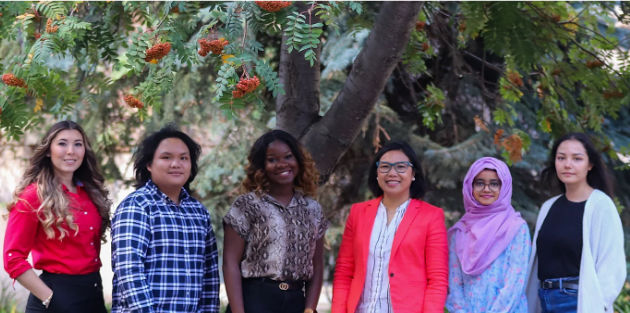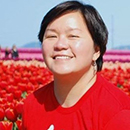May 16, 2023 - Having been born and raised in an archipelagic country surrounded by water, environmental engineer and professor Maricor Arlos’ place in the Canadian academe on water and wastewater research comes as no surprise.
The middle child of three, Arlos was 18 when her family left Negros Occidental for Canada. “The decision to move was really from my parents,” recalls Arlo in an exclusive interview with Canadian Filipino Net (CFNet). “They wanted different opportunities for their kids.”
And so it was those opportunities that took the teenage math and science nerd all the way to the University of Alberta (UofA) as an engineering faculty and lead researcher of the University’s research group named after her, Arlos Research Group (www.arloslab.com), that specializes in municipal wastewater-related research projects.
 Maricor Arlos, third from right, with members of the Arlos Research group. Photo from www.arloslab.com
Maricor Arlos, third from right, with members of the Arlos Research group. Photo from www.arloslab.com
Arlos shared with CFNet how she found her way to environmental wastewater management research. “When I was selecting a field in engineering, environmental engineering was definitely on top of the list,” said Arlos. It also helped that her experience while taking both undergraduate and graduate degrees were “truly enriching” paving the way towards her current research career.Arlos took her bachelor’s and master’s degrees in environmental engineering and a doctoral degree in biology all three in a span of 11 years at the University of Waterloo in Ontario; she also spent time as a postdoctoral fellow at the Swiss Federal Institute of Aquatic Science and Technology in Switzerland for a couple of years.
But more exciting than her academic history is the work she is currently doing with the Arlos Research Group and the opportunities it creates not only for young Canadians but Filipinos as well.
One research project spearheaded by Arlos is a partnership with the Laguna Lake Development Authority and involves the “bioanalytical monitoring of Laguna Lake (in the Philippines) to scope out environmental and human health impacts…associated with pollution.”
Simply put, the project aims to assess the current state of Laguna Lake and use data collected from samples for future chemical detection and monitoring. The end goal is to ensure that Laguna Lake, the Philippines’ largest freshwater lake, remains healthy and viable for fish and other marine organisms.
Reflecting on her birth and adopted countries, Arlos observed that wastewater treatments are worlds apart. “Here in Canada, urban cities are serviced by a central sewer/wastewater system which then goes to a treatment plant that cleans it up before discharging into the receiving environment which could be a lake, river or creek.”
Arlos shared with CFNet that replicating this system in the Philippines can be “challenging” as such system requires investment in infrastructure systems that the country lacks. However, Arlos thinks that a “decentralized” set-up is feasible where wastewater could be treated in individual homes or in small residential areas instead of discharging raw sewage directly into the receiving environment.
Inspired by her own journey in environmental engineering and research, Arlos, with the help of family and friends, established a scholarship for Filipino high school students interested in pursuing environmental studies. The essays submitted to the competition showed the depth of awareness of watershed issues by the students which helped Arlos learn more about the water systems in the Philippines.
Carlo Bais, a graduate of the De La Salle University in the Philippines, was the award recipient who is now in a master’s degree program at the University of Alberta.
“Although the award was given in 2016, we did not really connect,” relates Arlos. Bais did not own a laptop, so Arlos’ family brought him one to allow him access to virtual lectures via Zoom. “My family sort of adopted him; Carlo now lives in the same city as me and I mentor him with regards to navigating the (Canadian) system here.”Arlos envisions working with Bais on a project in the Philippines.
In a UofA newsletter, Arlos had this to say: “I’m still on a journey. My heart leads me to go into these underserved communities and make a difference.”


